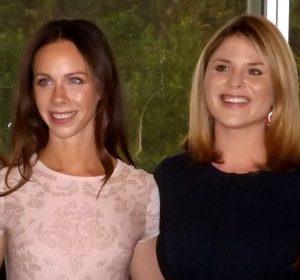Jenna and sister Barbara Bush address Mercy Foundation event, talk global health
by October 26, 2016 8:46 pm 586 views

Growing up in the public eye, Jenna Bush Hager and her twin sister Barbara Pierce Bush haven’t exactly retreated to a quiet and private life. The sisters are involved in separate global missions aimed at helping women and children because of work they each did abroad while in college and after.
The focus is UNICEF Next Generation for Jenna and Global Health Corp. for Barbara.
It is this work that brought the twin daughters of Laura and former President George W. Bush to Northwest Arkansas Wednesday (Oct. 26) as speakers for the Mercy Health Foundation Women with a Mission Giving Society luncheon at Crystal Bridges Museum in Bentonville. The Society was founded in honor of Susan Barrett in 2009 and brings together 364 members from the seven regions of Mercy Health System. The Northwest Arkansas group of 68 members has provided $345,000 in funding since 2009 for various programs at Mercy which benefit women and children. Each member gives $1,000 annually to the cause which has funded things like Mercy’s Reach Out and Read Literacy Program, bedded warmers for infants and operational expenses for the Ronald McDonald Room.
Barbara Bush said her and Jenna’s nonprofit work aligns with Mercy’s Women with a Mission Giving Society.
“We believe there are women in every community that can be empowered to work together to find solutions for health concerns in their own towns in Arkansas and surrounding states. That’s very much what our own mission work has been about,” Barbara Bush told Talk Business & Politics.
Jenna Bush Hager said having worked in the mission field abroad they learned firsthand how poverty and illness transcends borders.
“We worked with people in Latin America who were from right here in Arkansas. Barbara founded Global Health Corp. for not only nations abroad but also right here in the U.S. We love that Mercy Health empowers women and brings women together to talk about the issues that effect them and their children. We are proud to be onboard with a mission like that,” Hager said.

In a brief interview following the luncheon, Talk Business & Politics asked each sister to share why they chose their respective missions.
Barbara, a Yale graduate, said she began working in global health several years ago at the Red Cross Children’s Hospital in Capetown, South Africa, and then she interned for UNICEF in Botswana and saw huge opportunities for young people who were passionate and driven to find solutions for real problems in the global health arena. She is the founder and CEO of Global Health Corp.
“Millennials are kind of idealistic like that and that’s why I founded Global Health Corp., which is a fellowship program but more importantly trains leaders. We have fellows servings around the world. The fellows serve for one year and during that time they solve really hard challenges around global health,” she said. “Right now 750 fellows under 30 are staying in the field of global health and looking for ways to launch their own careers. This is really exciting because they could end up being in positions of great influence where they can serve people more effectively using their own platforms to solve challenging issues around healthcare.”
She said Global Health Corp. accepts just 2% of the applicants for its fellowship assignments which are located in the United States and Africa. When asked to share a favorite story about the program, Barbara described a 26-year-old fellow out of University of California Berkeley with a degree in engineering. She said he was working for the GAP as a supply chain manager charged with getting merchandise from the retailer’s distribution centers to stores or delivered at homes for online buyers.
“That’s a pretty basic supply chain job in the private sector in the United States, but he was always interested in social justice issues. When he joined us he moved to Tanzania where he worked for the Ministry of Health. This time he was tasked with getting the pharmaceutical drugs readily distributed across the country from warehouses to clinics and the patients that needed them. It’s the same skill set but a very different setting,” she said.
“Think about malaria and how having the medication readily available to treat it can make a huge difference for millions of people. When the Ebola outbreak happened, he moved to Sierra Leone to work on tackling this bigger issue. He took a skills set not related to healthcare but he’s been able to apply and grow that knowledge in the global health arena,” Bush said.
She said it’s not just doctors and nurses who can make a difference in global health issues, it’s people dedicated to a mission with whatever skill set they may have.
Jenna Bush Hager, a University of Texas graduate, began her career as a teacher in intercity Washington, D.C. and Baltimore. She said working with children is what led her to serve with UNICEF in Latin America.
“I loved UNICEF and what they stood for. I believe it’s important for all children, no matter where they live, to have access to education and good healthcare. Where you are born should not dictate the quality of your life,” Hager said.
When Hager became engaged, she knew her work would likely need to be centered in the United States but she was not ready to leave UNICEF.
“In talking with UNICEF about how I can stay connected to the mission, we realized that the majority of financial support the global organization gets is from people ages 70 and older, at least that’s how it was in 2008. I knew at the time I had friends who wanted to dial into a mission like UNICEF but the bigger, non-profits were just not attacking this generation. That’s when we started UNICEF Generation Next. There were 40 of us under 40 who started the group. We just wanted to make sure programs for educating children continued in the most vulnerable places in the world, like Syria,” said Hager.
Another issue near and dear to Hager is her recent appointment as the UNICEF and Rotary (Club) Ambassador to end polio.
“I am really excited about this because as a mom I just can’t imagine being told your child has developed this disease, mostly cured in the rest of the world. We are 1% away from seeing polio eradicated from the earth. We will see it in our lifetimes,” Hager said. “My father-in-law has spent four decades in a wheelchair because of polio … this is a personal mission for me as well.”
She said Pakistan, Afghanistan and perhaps Nigeria are the only places in the world were polio has not been eradicated.
“It’s very targeted and in vulnerable areas. UNICEF is in the areas and I hope to go out into the field and see some of the work that is going on with this mission. The Melinda Gates Foundation and other organizations are also committed to the cause. It’s very exciting to know that we can be part of this solution to end polio once and for all,” Hager said. “I am not sure it’s on the public’s radar here because it’s been 30 years since a case was diagnosed in the U.S. But for families like mine, it’s still very real. I want my children to know that it was eradicated in their lifetimes.”
In addition to her work with UNICEF Next Generation, Hager, mother of two, is also an author and contributing correspondent on NBC’s Today Show and an editor-at-large for Southern Living magazine.
